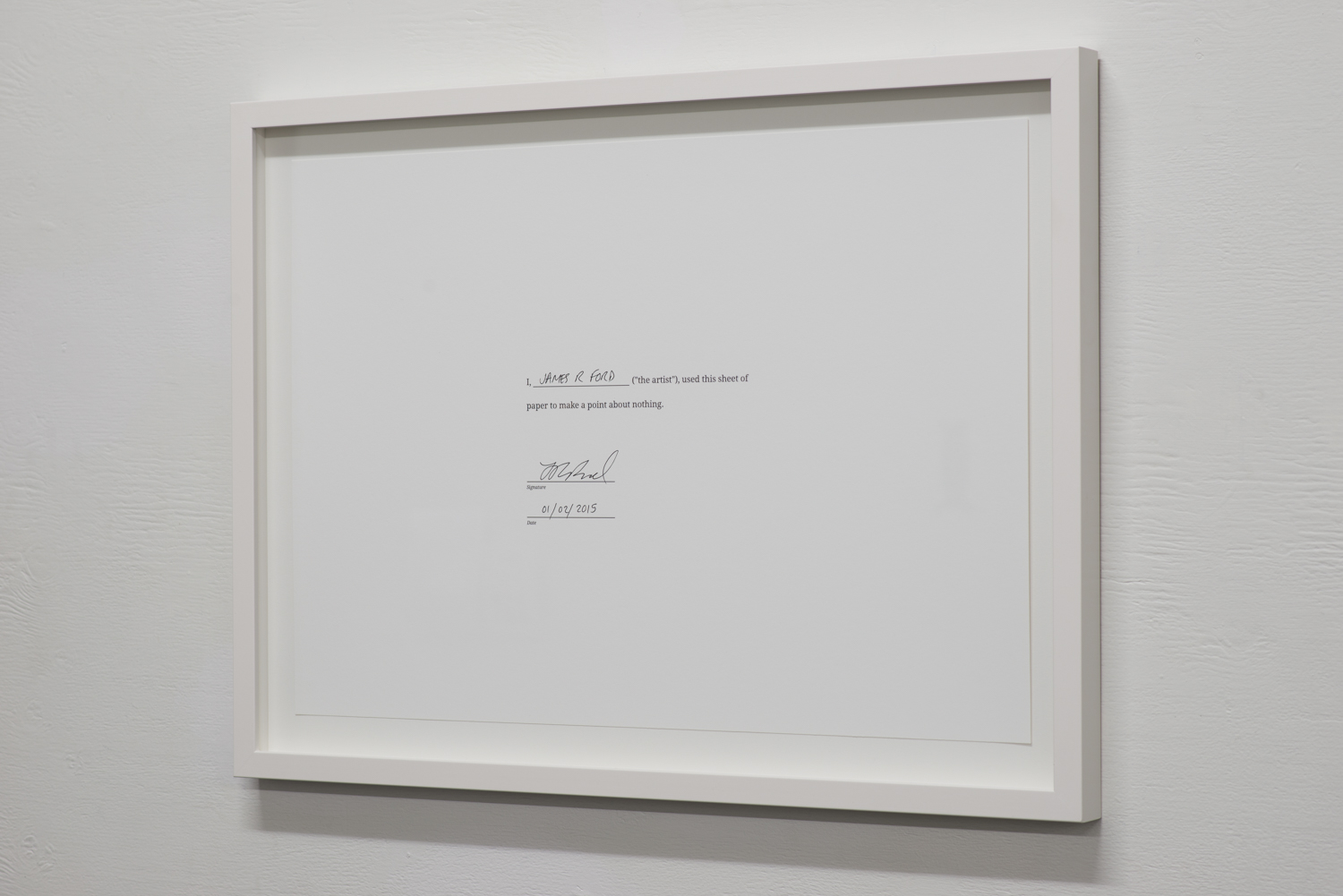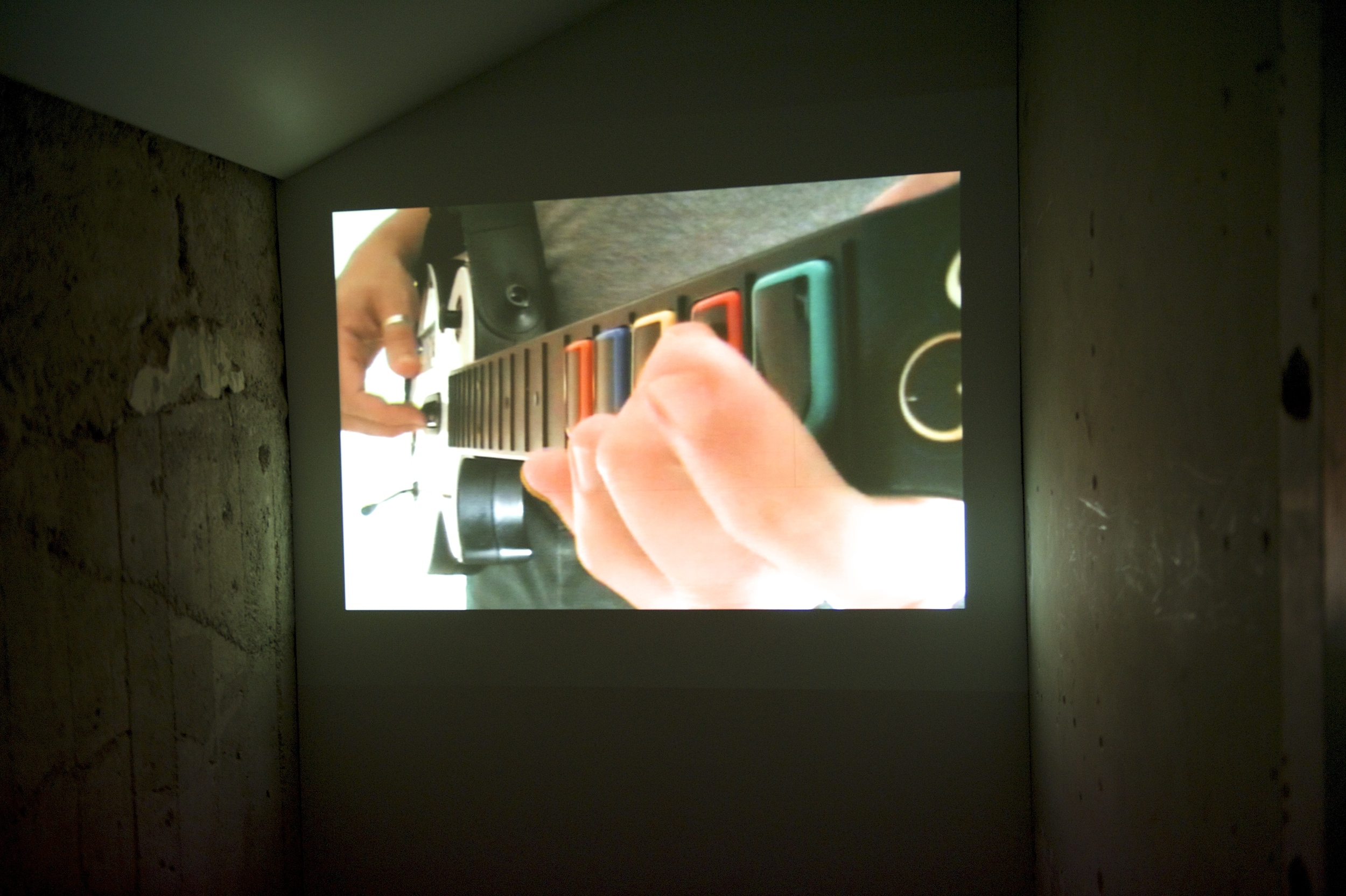Lollygag
lol·ly·gag
intransitive verb \ˈlä-lē-ˌgag\
: to spend time doing things that are not useful or serious : to fool around and waste time
Forever playfully exploring the intimate relationships between physical media and everyday life: James R Ford’s investigations into, and reflections on, existential nature and the use of conventional materials and modes of presentation reveal countless nuanced contradictions as well as a fascination with process and the filling in of time. While mostly a creator of laboured drawings, well considered objects and videos, Ford also provides us with scenarios that have us pondering over the mundane and/or acting out the absurd as he invites us to look deeper into his works and what is taking place around us.
There are several strands to the concept behind these works, but all question the nature of the artwork and our perception therein. The exhibition title, Lollygag, was chosen as the works on show may appear to be foolish or useless on first glance. The idea here is to look at how we spend our time, what is considered a waste of time, and how thought alone can bring worth to something seemingly “worth nothing”. Nothing as in empty, or the act of doing nothing (being idle, waiting, worrying), or the relative importance of an gesture or the worth of the artwork itself (nothing to offer, waste of time, pointless).
Bertrand Russell, from the essay “In Praise of Idleness”, says “Time you enjoy wasting is not wasted time.” This can be applied to the time spent producing the artworks, or the time used by the viewer in looking and contemplating them. Where do “wastes of time” sit in your hierarchy of needs? Maybe we all need some things we don’t need for the subsequent virtue or pleasure they can bestow. The exhibition will consist of a new body of work including film, drawing, painting and object assemblage. With Hat Stand (Waiting for Godot) Ford invites viewers to try on and swap the hats on display, assuming other identities or personas, especially if you find yourself waiting for something.
Biography
Ford (b. 1980, UK) studied at Goldsmiths College in London and currently lives and works in Wellington. He has exhibited widely throughout New Zealand and overseas and in 2013 was winner of the inaugural Tui McLauchlan Emerging Artist's Award from the New Zealand Academy of Fine Arts. In 2014 Ford published a book of selected works, with accompanying texts, interviews and essays from 2008-2013, entitled Fail Better.
lol·ly·gag
intransitive verb \ˈlä-lē-ˌgag\
: to spend time doing things that are not useful or serious : to fool around and waste time
Forever playfully exploring the intimate relationships between physical media and everyday life: James R Ford’s investigations into, and reflections on, existential nature and the use of conventional materials and modes of presentation reveal countless nuanced contradictions as well as a fascination with process and the filling in of time. While mostly a creator of laboured drawings, well considered objects and videos, Ford also provides us with scenarios that have us pondering over the mundane and/or acting out the absurd as he invites us to look deeper into his works and what is taking place around us.
There are several strands to the concept behind these works, but all question the nature of the artwork and our perception therein. The exhibition title, Lollygag, was chosen as the works on show may appear to be foolish or useless on first glance. The idea here is to look at how we spend our time, what is considered a waste of time, and how thought alone can bring worth to something seemingly “worth nothing”. Nothing as in empty, or the act of doing nothing (being idle, waiting, worrying), or the relative importance of an gesture or the worth of the artwork itself (nothing to offer, waste of time, pointless).
Bertrand Russell, from the essay “In Praise of Idleness”, says “Time you enjoy wasting is not wasted time.” This can be applied to the time spent producing the artworks, or the time used by the viewer in looking and contemplating them. Where do “wastes of time” sit in your hierarchy of needs? Maybe we all need some things we don’t need for the subsequent virtue or pleasure they can bestow. The exhibition will consist of a new body of work including film, drawing, painting and object assemblage. With Hat Stand (Waiting for Godot) Ford invites viewers to try on and swap the hats on display, assuming other identities or personas, especially if you find yourself waiting for something.
Biography
Ford (b. 1980, UK) studied at Goldsmiths College in London and currently lives and works in Wellington. He has exhibited widely throughout New Zealand and overseas and in 2013 was winner of the inaugural Tui McLauchlan Emerging Artist's Award from the New Zealand Academy of Fine Arts. In 2014 Ford published a book of selected works, with accompanying texts, interviews and essays from 2008-2013, entitled Fail Better.















